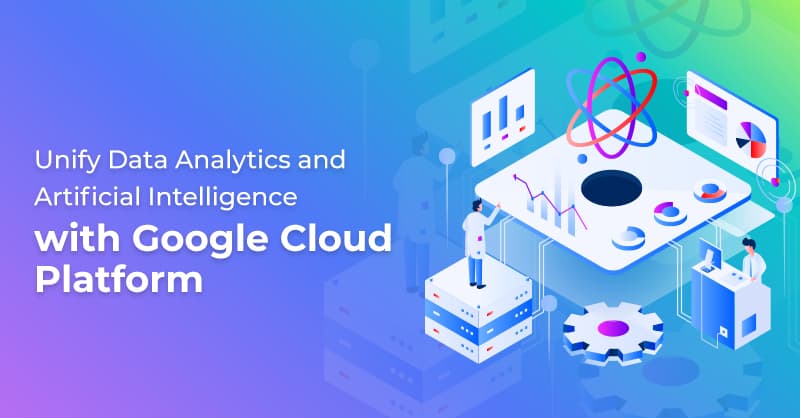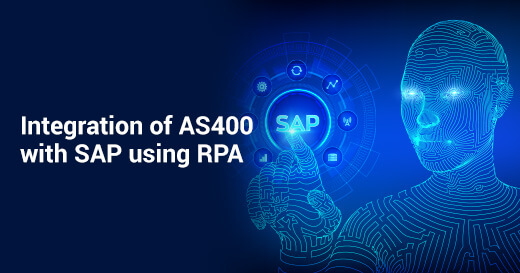Robotic Process Automation vs. AI—The Hype Explained
Written by Imran Abdul Rauf
Technical Content WriterAccording to Grand View Research, the global robotic process automation business is expected to surpass $25.5 billion by 2027, and artificial intelligence is on course to reach $390.9 billion mark by 2025. And AI fusing together with RPA is the real deal as digital transformation companies like Royal Cyber are relentlessly working to augment operational efficiency in the digital space.
We’re going to skip the fundamentals of RPA and dive straight in the concepts of artificial intelligence and how the technology is complementing with automation processes.
What is AI? How it Differs from RPA?
Robotic process automation’s potential is huge, moreover, AI can only push it even further. This is how companies providing RPA services like Royal Cyber, tend to incorporate AI into every part of their platform to help businesses reach new levels of productivity and automation. Putting it simply, artificial intelligence is a close relative to the RPA bots with similar concepts and thought process. Both the technologies work hand-in-hand to support automation in different industries allowing systems and teams to automate new, more complex tasks.
Artificial intelligence is capable of handling complex tasks that previously required human workforce. AI is able to make smart decisions based on their detailed, complex assessments of large data sets to predict different outcomes. This human intelligence simulation can actually proceed beyond typical execution into comprehending various documents, conversations, virtual desktops and visual screens, and discovering tasks and processes to automate, processing language, and analyzing semi-structured and structured data sets.
Understandably, for years AI seemed to only occur as a fictional masterpiece we got to see in movies like The Matrix; I, Robot; and so on. But the reality and commercial practicality is happening now!
Here we aren’t talking about the general artificial intelligence that is set to take over the world, as per Elon Musk. Rather, the practical aspects that fabricate machine learning models working to create superior human experiences and efficient processes. This kind of automation is an application of AI that complements RPA tools in workplaces.
Hence, infusing artificial intelligence in RPA could prove to be a game changer that companies must embrace.
AI & RPA—Understanding the Codependency
If we talk about creating and executing an automation strategy, both automation and AI are equally answerable to facilitate operational efficiencies at enterprise level. The prospect of making two partner technologies work together is to cut unwanted processes, make human life easier, and streamline their own respective processes.
How Healthcare Institutions Work?
Consider an example of the two technologies being applied in clinics and hospitals. If we talk about differential diagnoses processes in hospitals for the ongoing pandemic, RPA can examine a set of COVID-19 symptoms like body aches, high fever, etc., and notify doctors and physicians for new cases. Unfortunately, RPA is restricted to close ended questions only. In short, “yes or no” discussions which can’t process more complex criteria (on which many medical cases and healthcare processes rely).
On the plus side, RPA robots can make use of this baseline patient or clinical data for more sophisticated, predictive processes analysis lying in the jurisdiction of artificial intelligence. Additionally, hospitals and clinics can complete the first screening of patients through RPA, and then use AI to examine x-rays and provide treatment recommendations. Besides COVID-19, AI is also used to determine low birth-weight pregnancies and reduce the time to treatment.
“RPA in Healthcare” Webinar for Healthcare Automation Seekers
Join our session, where industry professionals and SMEs from UiPath and Royal Cyber discusses the dynamics of RPA in the healthcare precinct and how businesses can utilize automaton solutions to improve their operational procedures and efficiencies.
Moving beyond the healthcare sector, AI-driven automation processes have penetrated a number of different industries to acquire efficiency gains, employee development, and enable better customer satisfaction.
When is the Right Time to Implement RPA, and AI?
There’s a definite rule of thumb to help you decide whether a process should be carried through RPA or AI. Start by automating the fundamental tasks that are quite simpler in process, and then move on to employ AI to workflows and systems which are comparatively much more complicated for RPA to handle on its own. In doing so, you’re not only obtaining quick, short wins in your efforts, but also laying down an automation roadmap that you can later enhance and magnify through AI.
On the baseline, RPA makes way for an underlying process in order to seamlessly integrate a framework on top of your already running digital infrastructure. And without this essential foundation, the possibility of consolidating AI in the systems is expensive, and seemingly difficult. Besides that, without RPA, you would need to add AI manually in your processes. Despite the fact, there is a workaround worth noticing. If your business has already invested considerably in business process automation, you now have the opportunity to inculcate AI and RPA from a holistic standpoint.
Which Types of Processes Qualify for AI?
After you’ve automated the basic processes, now you can start considering the complex ones which require a definite inclusion of AI such as:
- Processes like loan defaults, support property valuation, inventory predictions, and alike where predicting a 100% outcome is nearly impossible
- Processes like language translation, buying behavior, purchase patterns, etc. that do not follow a predefined rulebook
- Processes depending on unstructured data from videos, images, emails, documents, and so on for email marketing, processing billing, and converting speech to text
Do you Need RPA, AI, or Both?
Using RPA for your business is a tempting prospect, still there’s always a certain threshold on how far can you go with flowchart-friendly process automation. At the same time if you only bear on artificial intelligence, you won’t have the infrastructure and lifecycle assistance to grow and most probably face slow integration.
Apparently, you need a reliable service provider proficient in AI-based RPA services that can help you deal with the operational issues and communication gaps between departments, processes, verticals, and strategic decision making.
How Can Royal Cyber Help your Enterprise?
Royal Cyber is a digital transformation company helping entrepreneurs, companies, and agencies streamline and automate their business processes and acquire excellence through efficient, data-driven automation.
Our aim is to integrate AI and RPA in an effortless manner and work further from the underlying data layer and support the entire communication channel between front-end apps. Contact us at [email protected], and get in touch with our RPA experts on board and learn how our RPA services can assist your business through AI-driven automation robots.



